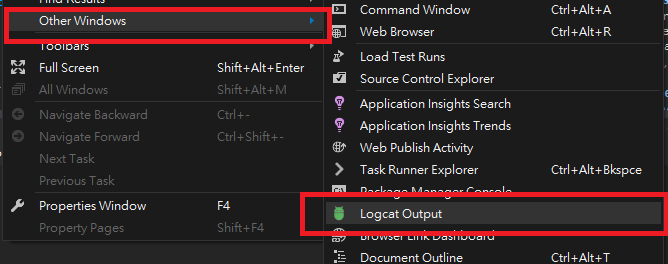Reputation: 8271
Visual Studio debug log (like logcat in Android)?
I'm trying to debug a C#/.Net program in Visual Studio 2010 but it's timing-sensitive so breakpoints mess it up. So I just want to log certain events and their relative times and watch them as my program is running.
Does Visual Studio (or C# or .Net) have any facility for writing to a log file that Visual Studio can display as a debug window?
When I do Android development in Eclipse I can take advantage of their Log class and insert lines that looks like this in my code:
Log.d("Label1", "Hit checkpoint X");
And they will appear along with time/date stamps in the LogCat window which is displayed along with other windows in Eclipse.
What's the closest equivalent to this in Visual Studio 2010?
Upvotes: 7
Views: 8283
Answers (4)

Reputation: 502
Use Android Logcat Output plugin:
https://marketplace.visualstudio.com/items?itemName=LancelotChen.AndroidLogcatOutput
Visual Studio Tool Window Extension for Android Logcat Output & Filter
Inspired by NVidia Nsight Tegra.
To launch the logcat output window, use Menu
View --> Other Windows --> Logcat Output

Then the logcat output window will show.
 On the left pane is filter list, you can add new filetr. Make one filter checked, the logs will be filtered.
On the left pane is filter list, you can add new filetr. Make one filter checked, the logs will be filtered.
Right-click on filter will bring out conext menu, which you can use to delete or edit filter settings.
Upvotes: 1

Reputation: 337
For whatever reason, this question was at the top of my Google search when looking for something similar (though it's 5 years old), so in case anyone else comes across it, this is the easiest method I've encountered:
Debug.WriteLine("hit checkpoint X");
It's included in System.Diagnostics, so you'll need a using System.Diagnostics at the top of your file, but that's all you need.
Upvotes: 2
Reputation: 7097
There isn't really anything built in exactly like logcat, but there are lots of logging frameworks that you can use.
Personally, I like to use NLog and set up a UDP target for tracing/debugging within my configuration file along with a rule to forward all loggers to the target. I think that NLog is easier to use than Log4Net (the .NET port of Log4j). Once you do this you can create a logger from the manager and call the logger just like LogCat in android:
Logger logger = LogManager.GetLogger("MyClassTag");
logger.Trace("Something to log");
logger.Debug("Something to log");
logger.Info("Something to log");
logger.Warn("Something to log");
logger.Error("Something bad to log", exception);
logger.Fatal("Something bad to log", exception);
For listening to the UDP logging packets I use Log2Console which allows me to view them just like android's logcat viewer.
Upvotes: 2
Reputation: 17731
You can set a breakpoint that doesn't actually break, but outputs a log message instead. Just set a breakpoint, then right click on the breakpoint and select "When Hit...".
From that dialog select "Print a message" and "continue execution"

Upvotes: 6
Related Questions
- Debug in Visual Studio
- Visual Studio log file
- How to view debugging output in Visual Studio 2010?
- logging debug messages to console in c#
- Logging and debug messages
- Custom Debug Output in Visual Studio 2010
- Capture console output for debugging in VS?
- Can I make the VS debugger print a log message when reaching a line?
- .NET Debug log
- How to log stuff in console in Visual Studio C++